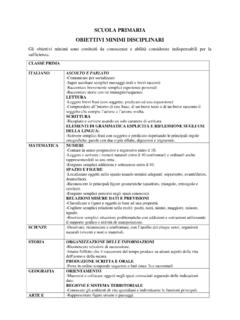Transcription of Financial Knowledge and Best Practice Behavior
1 Financial Knowledge and Best Practice Behavior Cliff A. Robb and Ann S. Woodyard The current research examines the relationship between personal Financial Knowledge (both objective and sub- jective), Financial satisfaction, and selected demographic variables in terms of best Practice Financial Behavior . Data are taken from the Financial Industry Regulatory Authority's (FINRA) National Financial Capability Study, a nationally representative sample of 1,488 participants and are analyzed using multiple regression analysis. Findings suggest that both objective and subjective Financial Knowledge influence Financial Behavior , with sub- jective Knowledge having a larger relative impact.
2 Other variables that have a significant impact on Financial Behavior include Financial satisfaction, income, education, age, race, and ethnicity. Key Words: Financial Behavior , Financial Knowledge , Financial satisfaction Introduction decisions (Gruber & Wise, 2001; Poterba, Rauh, Venti, &. Individuals' Financial well-being is incumbent on their Wise, 2006). actions. Although influenced by external forces such as economic factors and policy structures adopted by govern- A common response to this lack of Financial Knowledge is ment and private industry, decisions are ultimately made the prescription of education (Scott, 2010), with the gen- by individuals. Understanding the relationship between eral assumption that improved Knowledge will result in Knowledge of personal Financial issues and corresponding more effective Financial decision-making.
3 Some evidence Financial Behavior is increasingly recognized as an area of indicates that the relationship between Knowledge and be- critical Financial importance. Recent economic troubles in havior is more complicated as improved Knowledge does the United States and abroad highlight the importance of not automatically result in improved Behavior (Braunstein understanding Financial markets. & Welch, 2002). Perry and Morris (2005) suggested that psychological factors, such as locus of control, may medi- The American public is increasingly aware of a fact which ate the impact of Financial Knowledge on Behavior . The researchers have known for years: there is a general lack present data suggest that Financial Knowledge is important, of Financial Knowledge among United States citizens but questions remain as to the exact nature of Knowledge 's of all ages (Avard, Manton, English, & Walker, 2005; impact on overall Financial well-being.)
4 Chen & Volpe, 1998; Hilgert, Hogarth, & Beverly, 2003;. Jump$tart, 2008; Lusardi & Mitchell, 2007; Mandell & Review of Literature Klein, 2009; Markovich & DeVaney, 1997; Volpe, Chen, Knowledge and Behavior & Liu, 2006; Warwick & Mansfield, 2000). This lack of Theoretically, Knowledge of how Financial markets operate Knowledge is increasingly salient as changes to the United should result in individuals making more effective borrow- States Financial system make personal finance an important ing decisions (Liebermann & Flint-Goor, 1996). This is topic. Understanding issues related to personal finance is generally supported by the available literature as numer- important for Americans' long-term Financial security as ous studies indicated that well developed Financial skills the transition to defined contribution plans and the weak- are necessary for effective money management (Carswell, ening of the United States Social Security system place 2009; Collins, 2007; Haynes-Bordas, Kiss, & Yilmazer, greater responsibility on individuals' savings and Financial 2009; Scott, 2010).
5 However, the majority of these studies Cliff A. Robb, , Assistant Professor, Department of Consumer Sciences, University of Alabama, 304 Adams Hall, Tuscaloosa, AL 35487, (205) 348-1867. Ann S. Woodyard, , CFP , Assistant Professor, Department of Consumer Sciences, University of Alabama, 212 Adams Hall, Tuscaloosa, AL 35487, (205) 348-9173. 60 2011 Association for Financial Counseling and Planning Education . All rights of reproduction in any form reserved. failed to provide a direct link between personal Financial positively related. Hilgert, Hogarth, and Beverly (2003). Knowledge and actual Financial Behavior . Several stud- examined the correlation between Financial Knowledge and ies provided evidence of a link between Knowledge and actual Behavior among the general population in the Unit- Behavior , though they vary in how Knowledge is measured ed States.
6 They measured Knowledge using the 28-ques- and what behaviors are addressed. tion Financial IQ measure that is included in the Survey of Consumer Finances, which deals with aspects of cash-flow Numerous studies of Financial Knowledge emphasized management, credit management, savings, investments, college student populations; some for convenience and mortgage information, and other Financial -management others as a population of interest (Borden, Lee, Serido, & topics (Hilgert et al., 2003). The researchers noted signifi- Collins, 2008; Chen & Volpe, 1998; Jones, 2005; Robb, cant correlations between credit management scores and 2010; Robb & Sharpe, 2009). Chen and Volpe (1998) es- scores on the composite measure of Financial Knowledge .
7 Tablished a link between Financial Knowledge and Financial Lusardi and Mitchell (2006) analyzed retired households, decisions, though it was tenuous at best as the decisions indicating that greater Knowledge was associated with were purely hypothetical. Based on a 36-item measure of planning and succeeding in retirement planning, as well Knowledge , more knowledgeable students achieved higher as investing in complex assets such as stocks. Further re- scores on hypothetical spending, investment, and insur- search by Lusardi and Mitchell (2007) indicated that more ance decisions when compared with less knowledgeable knowledgeable Americans thought more about retirement. students. More knowledgeable students were also more likely to keep Financial records.
8 To this point, the discussion has emphasized objective fi- nancial Knowledge . It is important to address the possible Borden et al. (2008) presented findings that questioned impact of subjective Financial Knowledge (or self-assessed the link between Knowledge and Behavior , as they did Knowledge ) as well. Research by Courchane (2005) indi- not note any significant relationship between Financial cated that self-assessed Knowledge was one of the most Knowledge and effective Financial Behavior . The results significant factors in determining Financial Behavior . How- presented by Borden et al. (2008) suggested that whereas ever, research has made it clear that people do not always have a full understanding of their own level of Financial greater Knowledge may improve student intentions to- Knowledge (Courchane, 2005).
9 Wards more responsible Behavior , it did not necessarily indicate whether or not students follow through with their Financial Satisfaction plans. Research on credit card use among college students Financial satisfaction is an individual's subjective percep- yielded conflicting evidence. An exploratory analysis by tion of the adequacy of his or her own Financial resources Jones (2005) did not provide any evidence of a link be- (Hira & Mugenda, 1998). Financial satisfaction has long tween credit card debt Behavior and Financial Knowledge been acknowledged as a component of well-being (Camp- based on a 6-item measure. bell, Converse, & Rodgers, 1976) and has received atten- tion in studies on wellness related stressors such as finan- Robb and Sharpe (2009) noted a significant relationship cial strain, risk management issues, locus of control and between credit card balance Behavior and Financial knowl- employment issues (Porter & Garman, 1993).
10 Edge, though not in the direction anticipated. Students with higher scores on a 6-item measure of Financial Knowledge While there is no consensus as to how Financial satisfac- indicated higher revolving balances, though causality was tion might best be measured (Joo & Grable, 2004), both not assessed because the data were cross-sectional. In single item and multiple item measures have been used to contrast, improved credit card management Behavior was achieve reliable and valid findings. Multiple item meas- associated with higher scores on a measure of Financial ures have consisted of scales ( , Hira & Mugenda, Knowledge in a recent study by Robb (2010). Specifically, 1998; Leach, Hayhoe, & Turner, 1994) or domains ( , Knowledge had an impact on the probability of individuals Draughn, LeBoeuf, Wozniak, Lawrence, & Welch, 1994).












